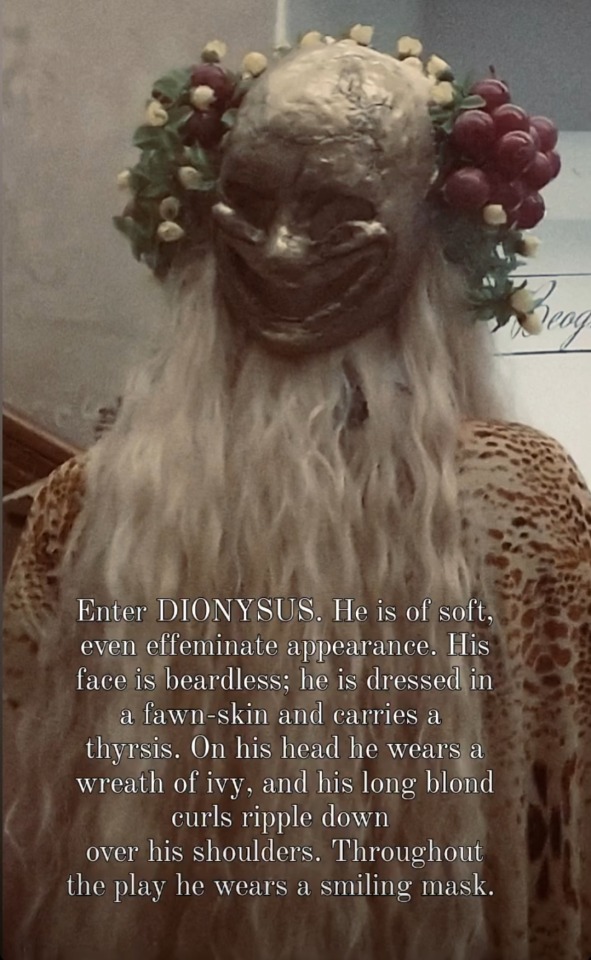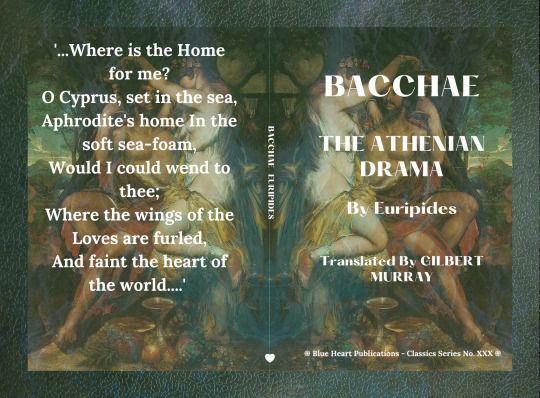#bacchantes
Explore tagged Tumblr posts
Text









ORPHIC HYMN #53
TO LORD DIONYSOS
I call upon Bacchos, the god we worship annually,
chthonic Dionysos,
together with the fair-tressed Nymphs
he is roused.
In the sacred halls of Persephone
he slumbers and puts to sleep
pure
Bacchic time, every third year.
When he himself stirs up
the triennial revel again,
he sings a hymn
together with his fair-girdled nurses.
As the seasons revolve,
he puts to sleep and wakes up the years.
O blessed and fruit-giving Bacchos,
O horned spirit of the unripe fruit,
come to this most sacred rite
with a glow of joy on your face,
come teeming with fruit
that is holy and perfect.
(edited with the Apostolos Athanassakis trans.)
#lord dionysus#dionysus#dionysos#bacchus#bacchic#dionysian#dionysus deity#dionysos deity#dionysus worship#bacchanalia#lenaia#the bacchae#bacchae#bacchantes#bacchante#wine#persephone#chthonic#chthonic gods#hellenic polytheism#hellenic#hellenistic#hellenism#greek mythology#greek myth#orphic hymns#orphic hymn 53
314 notes
·
View notes
Text

The Bacchante
c. 1853
Artist : Jean Léon Gérôme
#jean léon gérôme#bacchante#maenad#classic art#mythologie#mythology#greek mythology#ancient greek#thiasus#bassarids#bacchae#bacchantes#bacchus#dionysus#dionisos#roman mythology#mimallones#klodones#thyiades#potniades#mythological#dionysios#1850s#1853#supernatural
1K notes
·
View notes
Text

Jean-Baptiste Marie Pierre (French, 1714–1789) Autumn, n.d. Pieter Smidt van Gelder musem, Antwerp
#allegorical art#bacchantes#Tambourine#mediterranean#southern europe#greek mythology#roman mythology#mythology#mythological art#art#fine art#european art#classical art#europe#european#fine arts#oil painting#europa#Jean-Baptiste Marie Pierre#Autumn
67 notes
·
View notes
Text









#pompeii#mount vesuvius#ancient rome#pompeii ruins#frieze#megalography#life-sized figures#79AD#ruins#volcanic eruption#dionysus#ancient greek#god of wine#bacchantes#maenads#silenus#bacchanalia#archaeological park of pompeii#frescoes#house of thiasus#archaeology
27 notes
·
View notes
Text

"darkness confers sanctity."
The Bacchae, Euripides, translated by John Davie
#the bacchae#euripides#penguin classics#greek tragedy#dionysian#dionysos#dionysus#bacchus#bacchantes#maenads#greek mythology#ancient history#art history#literature#history
136 notes
·
View notes
Text

The Bacchantes
Artist: Austrian School
27 notes
·
View notes
Text

Bacchanal by Mato Celestin Medovic 1839 Found in the Temple of Dionysus fb group
#dionysus#dionysian#dionysians#dionysos#greek gods#greek mythology#dionysus god#greek pantheon#pagan#bacchus#bacchanalia#bacchantes
20 notes
·
View notes
Text
The Cow-Born Dionysus
¶“A feature in the mythical character of Dionysus, which at first sight appears inconsistent with his nature as a deity of vegetation, is that he was often conceived and represented in animal shape, especially in the form, or at least with the horns, of a bull. Thus he is spoken of as ‘cow-born,’ ‘bull,’ ‘bull-shaped,’ "bull-faced,’ ‘bull-browed,’ ‘bull-horned,’ ‘horn-bearing,’ ‘two-horned,’ ‘horned.’ He was believed to appear, at least occasionally, as a bull. His images were often, as at Cyzicus, made in bull shape, or with bull horns; and he was painted with horns. Types of the horned Dionysus are found amongst the surviving monuments of antiquity.

Black-figure Dionysus on a bull, in Dictionnaire des antiquités grecques et romaines, vol. I, pt. 1 (1873, p. 619).
(Source: C. Daremberg & E. Saglio, Public Domain, Internet Archive)
¶"On one statuette he appears clad in a bull's hide, the head, horns, and hoofs hanging down behind.

Dionysus wearing the hide of a bull, in Welcker’s Alte Denkmäler, vol. V (1849, p. 506).
(Source: Friedrich Gottlieb Welcker, Public Domain, Internet Archive)
¶"Again, he is represented as a child with clusters of grapes round his brow, and a calf’s head, with sprouting horns, attached to the back of his head.

Infant Dionysus adorned with calf’s head, in Archäologische Zeitung, vol. IX, pl. XXXIII (1851, see p. 135 of PDF).
(Source: Eduard Gerhard, Public Domain, Google Books.)
¶"On a red-figured vase the god is portrayed as a calf-headed child seated on a woman's lap.

Theriomorphic Infant Dionysus, in Gazette Archéologique, vol. V (1879, pl. III, p. 283).
(Source: A. Levy, Public Domain, Internet Archive)
¶"The people of Cynaetha in north-western Arcadia held a festival of Dionysus in winter, when men, who had greased their bodies with oil for the occasion, used to pick out a bull from the herd and carry it to the sanctuary of the god. Dionysus was supposed to inspire their choice of the particular bull, which probably represented the deity himself; for at his festivals he was believed to appear in bull form. The women of Elis hailed him as a bull, and prayed him to come with his bull's foot. They sang, ‘Come hither, Dionysus, to thy holy temple by the sea; come with the Graces to thy temple, rushing with thy bull's foot, O goodly bull, O goodly bull !’ The Bacchanals [i.e., Bacchantes] of Thrace wore horns in imitation of their god. According to the myth, it was in the shape of a bull that he was torn to pieces by the Titans; and the Cretans, when they acted the sufferings and death of Dionysus, tore a live bull to pieces with their teeth. Indeed, the rending and devouring of live bulls and calves appear to have been a regular feature of the Dionysiac rites. When we consider the practice of portraying the god as a bull or with some of the features of the animal, the belief that he appeared in bull form to his worshippers at the sacred rites, and the legend that in bull form he had been torn in pieces, we cannot doubt that in rending and devouring a live bull at his festival the worshippers of Dionysus believed themselves to be killing the god, eating his flesh, and drinking his blood.”
—J. G. Frazer, Spirits of the Corn & of the Wild, part 1 (The Golden Bough, vol. VII, 1912, p. 16-17)
#jg frazer#the golden bough#the golden bough vol vii#dionysus#greek mythology#bulls#paganism#ancient greece#sparagmos#crete#minoan crete#communion#bacchanal#ritual#bacchantes#greek gods
13 notes
·
View notes
Text

Lalique 'Bacchantes' vase (glass, designed 1927 and produced post-1951)
from here
4 notes
·
View notes
Text

from The Bacchae: A City Sacrificed to a Jealous God by Richard Schechner
6 notes
·
View notes
Text

#maenads#the bacchae#greek mythology#dionysus#bacchantes#cw: gore#cw: nsft#original art#traditional art
10 notes
·
View notes
Text









ORPHIC HYMN #46
TO DIONYSUS LIKNITES
I summon to these prayers
Dionysos Liknites,
born at Nysa, blossoming,
beloved and kindly Bacchos,
nursling of the Nymphs
and of fair-wreathed Aphrodite.
The forests once felt your feet
quiver in the dance
as frenzy drove you and the graceful Nymphs
on and on.
The counsels of Zeus brought you
to noble Persephone,
who reared you to be loved
by the deathless gods.
Kindheartedly come, O blessed one,
accept the gift of this sacrifice.
(trans. by Apostolos Athanassakis)
#reposting this cuz something went wrong the last time I posted it :/#happy first day of Anthesteria by the way!! :D#lord dionysus#dionysus#dionysos#bacchus#bacchic#dionysian#dionysus worship#dionysus deity#dionysos deity#dionysus devotee#dionysos devotee#aphrodite#anthesteria#bacchanalia#bacchae#bacchante#bacchantes#hellenic polytheism#hellenic paganism#hellenism#hellenismos#hellenic#helpol#greek mythology#greek gods#ancient greek gods#orphic hymns#orphic hymn 46
164 notes
·
View notes
Text


11 notes
·
View notes
Text

Orpheus Torn to Pieces by the Bacchantes.
#greek mythology#orpheus#greek heroes#argonauts#bacchantes#greek tragedy#mythology#illustration#ovid's metamorphoses
3 notes
·
View notes
Text

A Feminist Theory of Refusal, by Bonnie Honig
2 notes
·
View notes
Text
Dionysian Delirium Unleashed: A Riveting Odyssey into Euripides' Bacchae

Euripides' timeless masterpiece, "Bacchae," as brilliantly translated by Gilbert Murray, serves as an electrifying exploration into the essence of human nature and the intoxicating power of the divine. This Athenian drama unfolds with an enigmatic title that hints at revelry, and indeed, the narrative plunges the audience into the captivating chaos of Dionysian rites. Murray's translation masterfully captures the raw energy and mysticism of the original text, plunging readers into a world where reason battles ecstasy, and the boundaries between mortals and gods blur into a thrilling dance of delirium.
The play centers around the god Dionysus, who descends upon Thebes to assert his divine identity. The portrayal of the erratic and orgiastic rituals of the Bacchantes, led by the charismatic yet enigmatic Dionysus, becomes a metaphorical journey into the deepest recesses of human psychology. Murray's linguistic prowess and sensitivity to the nuances of ancient Greek bring forth the rich tapestry of tragedy, ecstasy, and divine intervention that permeates every scene.
As the tension between Dionysus and the skeptical King Pentheus escalates, the audience is drawn into a complex web of power, belief, and the consequences of denying the divine. Murray's translation skillfully weaves together the poetic and the profound, ensuring that the play's philosophical undercurrents are as resonant today as they were in ancient Athens.
"Bacchae" is more than a dramatic spectacle; it is a philosophical inquiry into the nature of faith, reason, and the consequences of defying the divine order. Murray's translation adds a layer of accessibility without sacrificing the original's poetic brilliance, making this rendition an ideal entry point for both seasoned scholars and newcomers to Greek tragedy.
In conclusion, "Dionysian Delirium Unleashed" is a riveting journey through the mystical and tumultuous realm of "Bacchae," inviting readers to question the boundaries of sanity, embrace the divine within, and confront the consequences of resisting the call of the god of wine and revelry.
"Bacchae," of Euripides skillfully translated by Gilbert Murray is available in Amazon in paperback 10.99$ and hardcover 18.99$ editions.
Number of pages: 152
Language: English
Rating: 8/10
Link of the book!
Review By: King's Cat
#Euripides#Bacchae#Athenian drama#Greek tragedy#Dionysian rituals#Divine ecstasy#Gilbert Murray translation#Ancient Greek theater#Thebes#Dionysus#Pentheus#Bacchantes#Tragedy and ecstasy#Greek mythology#Theater of the absurd#Ritual madness#Divine intervention#Theatrical mysticism#Power and belief#Mythological transformations#Greek classics#Poetic brilliance#Dramatic tension#Philosophical inquiry#Religious symbolism#Classical literature#Mythic confrontation#Enigmatic revelry#Athenian culture#Theatrical exploration
7 notes
·
View notes